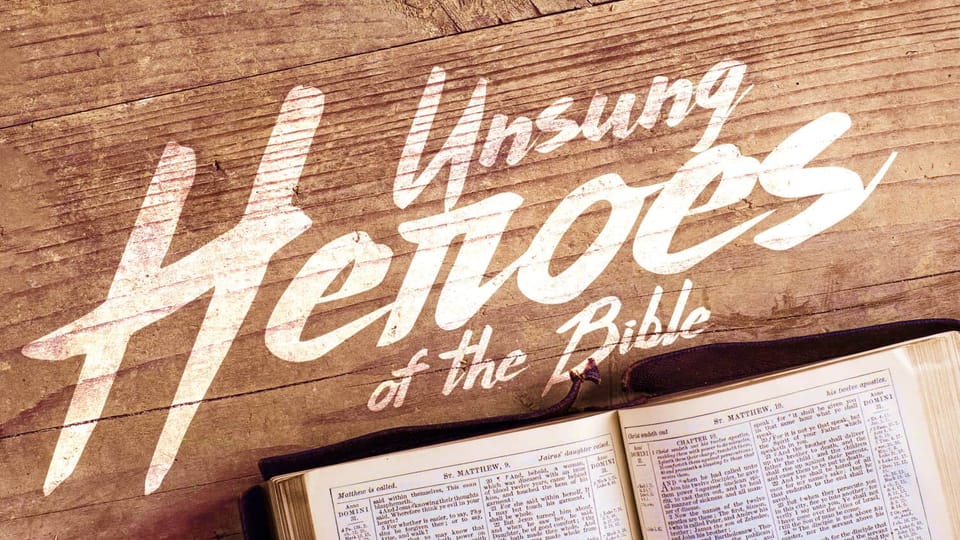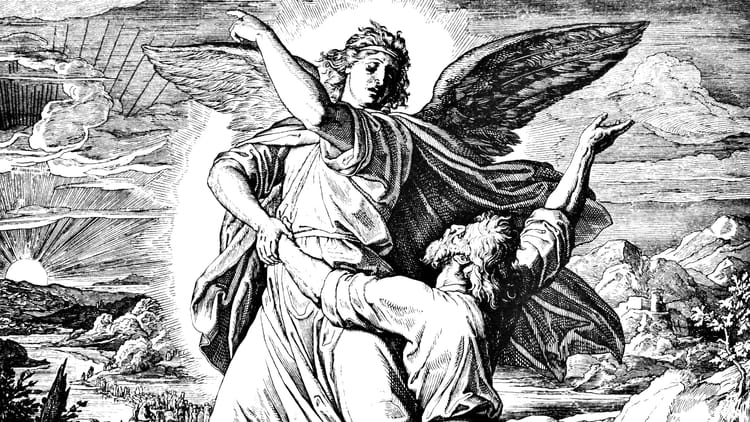Unsung Heroes: Tamar (Genesis 38)

Big Idea: God works in the worst events of our lives, both to accomplish his purposes and to transform our characters.
She’s one of the best-known authors alive today. She has achieved remarkable success, selling between 450 and 500 million books. Her life has been a true rags-to-riches story. She went from losing her mother, going through a divorce, and living on social assistance to becoming one of the top 200 richest people in Britain. She’s been named the most influential woman in Britain.
But she didn’t get there without rejection. In fact, her first series of books was rejected by many publishers. Even after she became one of the world’s best known writers, she was rejected and even advised to take a writing course. Her name is J.K. Rowling, author of the Harry Potter series of books.
We love stories like Rowling’s. It’s one thing for “successful” people to get ahead. They had it all to begin with, so it’s not a surprise to see them succeed. The real surprise comes when a person has nothing going for them and still ends up accomplishing something significant. It gives hope that the same thing may be possible for us too.
That’s why we’re going to spend a few weeks looking at some of the unlikely heroes of the Bible. We tend to think that God uses the successful, the gifted, those who are most likely to succeed. We’re going to see that God actually uses the most unlikely people, the ones who had nothing going for them, the ones everyone else would have voted least likely to succeed.
Today we’re going to look at a very seedy story. It’s one of those stories that’s deeply disturbing as you read it. In fact, I don’t think I’ve ever preached a sermon on this passage or heard one. It’s one of those passages that we tend to skip over. Some people have struggled with this passage so much that they even wonder what it’s doing in the Bible.
Let me tell you the story, and then let me tell you what I think we can learn from it.
The Story
First, let’s look at the story. This isn’t a story that we’re likely to share with our kids anytime soon. One author says that this story is among the top ten in the Bible that pastors tend to skip. You can understand why.
This story is set in the context of a pretty amazing story: God graciously called a family — Abraham’s family — to himself to be a people and to become a nation that would bless the entire world. The overall context of this story is amazing. God could have written humanity off, but he chose not to. Instead, he chose to love humanity and to begin a plan for our rescue. The big picture of this story is hopeful.
But the minute we begin to look at the characters in the story, we start to get a little depressed. “These are the people that God chose?” we ask. “What hope is there with people like this?” And that’s exactly what we see in this story. This looks like it came from a seedy daytime talk show. It doesn’t get much worse than this.
It begins with Abraham’s great-grandson, Judah. We’re still in the early stages of God forming this family into a nation that will one day bless the whole earth. But already things are going horribly wrong. Abraham’s great-grandsons have already sold off one of their brothers out of jealousy, and they’re about to begin another tragic episode. In fact, this story seems to interrupt the bigger story, which is a bit of a clue to pay attention. Something’s going on here.
Abraham had warned his family not to marry any of the Canaanites. That sounds strange to us today. It had nothing to do with interracial marriage. It was because the Canaanites had been cursed all the way back in Genesis 9. It was because the Canaanites had a completely different set of values and were known for being immoral. Abraham knew that his descendants couldn’t serve God and embrace the Canaanite culture at the same time. But here we see Judah marrying a Canaanite woman.
Not only that, but his kids were wicked as well. This is not a great family. Verse 7 says: “But Er, Judah’s firstborn, was wicked in the sight of the LORD, and the LORD put him to death.” Carolyn James helps us understand what this must have been like.
Lots of couples talk about the struggles of that first year of marriage. Tamar’s marriage was a nightmare by anyone’s standard. Any girlhood hopes she may have had for her future life were quickly shattered by her new husband. Scripture tells us her new husband was “wicked in the Lord’s sight,” but spares us the gruesome details. No one spared Tamar, however. She lived with Er’s wickedness every day. A dull, unhappy marriage is bad enough. Marriage to a wicked man is in a league all its own. Tamar’s marriage to Er was the antithesis of the Blessed Alliance. No one knows what Tamar suffered, but suffer she did. Er’s wickedness was so terrible, God stepped in and took his life. (Lost Women of the Bible)
This was not a good situation for Tamar, and then things get even worse.
There was something back then called levirate marriage. It meant that if a husband died without an heir, the husband’s brother was to marry a widow and produce an heir for him by proxy. If the brothers weren’t able to do this, it seems that the father may sometimes take on the role. This sounds bizarre to us now. But in the patriarchal society back then, this custom was designed to protect the woman, ensuring that she had a male provider and protector. It also ensured the continuance of the family line, and that the land would pass down to the next generation.
Later on, this would become the law of Israel. Deuteronomy 25:5-6 says:
If brothers dwell together, and one of them dies and has no son, the wife of the dead man shall not be married outside the family to a stranger. Her husband’s brother shall go in to her and take her as his wife and perform the duty of a husband’s brother to her. And the first son whom she bears shall succeed to the name of his dead brother, that his name may not be blotted out of Israel.
That’s what happens here. Er’s brother Onan marries Tamar, but he refused to allow her to get pregnant. He uses her. It could be that he’s protecting his larger share of the inheritance. If Tamar becomes pregnant with a son, then that son is recognized as the brother’s heir with a larger share of the inheritance. It doesn’t make financial sense for Onan to allow her to have a child, so he doesn’t let it happen, and God kills him too. Tamar has lost two husbands and is still childless.
Things get even worse. Judah treats Tamar like damaged goods and sends her away destitute to live as a widow. To live as a widow means to live without legal, economic, or social status. She’s sidelined without any recourse. It’s hard for us to picture how damaging this would have been for Tamar. She has no money, no options, and no hope. Picture not only losing your job but losing all hope, losing all ability to get any other job as well. That would be bad, but it’s not even as bad as what Tamar faced.
This is already a weird story, but it gets even weirder at this point. Judah’s wife eventually dies. Tamar hears the news and decides to take matters into her own hands. She dresses up like a prostitute. Judah propositions her, and Tamar becomes pregnant by her father-in-law, and finally gets the son that she was denied. She finally has options. When Judah discovers that Tamar is pregnant, he wants to kill her until he realizes that he’s the father. She eventually delivers and has two twins.
What a disturbing story. No wonder we don’t hear a lot of sermons about it! There are more disturbing stories in the Bible, but not many. It’s hard at first to understand what hope there is to find in a story like Tamar’s.
Two Lessons
As we think about this, I want to look at two lessons that we learn from this story. But first I want to explain why I’m drawn to this story.
Some of you have seedy stories in your life. I know I do. There are parts of my story that I wish that I could erase. My family’s story — both my parents and my own immediate family — includes a lot of heartbreak. One of the reasons I’m drawn to preach this story is that it isn’t sanitized, and neither are our lives. I’m so glad that the Bible is honest about when life gets really messy.
As we look at this story, I think we can learn at least two important lessons.
God works in the worst circumstances to accomplish his purposes.
Remember that this isn’t just any ordinary story. This is the story of the family that God chose to bless the world.
Not only that, but Tamar’s story becomes an important part of that story. Through Judah, she has twins: Perez and Zerah. Centuries later, both Tamar and Perez show up in Jesus’ genealogy in Matthew 1:3. Tamar and her child become not only a part of the best story of the world, but they become part of the means by which God creates a family line that leads to our Savior being born.
As the descendants of Abraham mushroomed into a nation, the blood line of her eldest son, Perez, became the golden cord that connected God’s promise of a redeemer in Eden with the birth of Jesus in Bethlehem thousands of years later. The crowning glory of Tamar’s efforts came when the name Jesus was inscribed on the Perez branch of Judah’s family tree. (Carolyn James)
God is at work in our stories, even our messy ones. God doesn’t just use us when we’re at our best or when things are going well. God uses even the hard and difficult episodes of our lives. Nothing is out of his control.
In this way it is possible to see all of life as the medium of God’s activity. He is not just active when we read our Bible and pray. He is also active when we live in our world. Hence, when we wake up tomorrow we don’t wake up to a day without God. Tomorrow is God’s day, for he made it, formed it, and works in it. What’s more, he wants you to enter tomorrow determined to be his person in it, and to let Christ be formed in you as you allow his word to interact with your situation. (Andrew Reid)
Do you have hard things in your life? Me too. Don’t think that God can’t use them, because God works in the worst circumstances to accomplish his purposes.
This is never more true, by the way, than when God’s own Son Jesus is killed. There has never been a greater injustice than what was committed on that day. And yet God used that injustice to bring about our salvation. Jesus’ death lead to our deliverance. God turned the greatest injustice to the greatest triumph. All who trust in Jesus can know that Jesus bore our sins, dying the death that we should have died. His death became our greatest hope. God works in the worst circumstance to accomplish his purposes. He still continues to do this today.
God works in the worst circumstances to transform our characters.
God was accomplishing something in history in this story. But he was also accomplishing something in the lives of two of the characters in this story: Tamar and Judah.
First, let’s look at Tamar. If you see Tamar as an evil woman who manipulated Judah, then you’ve missed the point. Tamar becomes a remarkable woman who starts out as a victim and ends up being praised. In verse 26 Judah says of her, “She is more righteous than I.” Why? Tamar wasn’t perfect. She was deceptive, but otherwise she acted properly. “Tamar it was within her rights; she did nothing that the law did not entitle her to do” (Lumina study notes).
In fact, later on she became praised. In the beautiful story of Ruth, the townspeople bless Boaz and Ruth by saying, “…may your house be like the house of Perez, whom Tamar bore to Judah, because of the offspring that the LORD will give you by this young woman” (Ruth 4:12). And Tamar’s name appears in later genealogies in 1 Chronicles and Matthew when women were rarely mentioned. God uses strong women by his grace and accomplishes his purposes through them.
But God also uses Tamar to transform Judah. Up until this point, there is nothing redeeming about Judah. He led the charge in selling Joseph into slavery. His sons are wicked. It seems that Tamar was able to guess that he’d be interested in going to a prostitute. And yet the next time we see him in chapter 43, he’s offering his life in exchange for his half brother.
It seems that Judah may have changed. And if he did, it’s possible that this incident with Tamar was the turning point. God used this story to not only shape the course of history but to shape the characters of both Tamar and Judah.
If you hear nothing else today, hear this: God works in the worst events of our lives, both to accomplish his purposes and to transform our characters.
I don’t know what you’re going through right now. But I can tell you this: don’t ever think that God isn’t at work or that God isn’t for you.
If God is for us, who can be against us? He who did not spare his own Son but gave him up for us all, how will he not also with him graciously give us all things?… No, in all these things we are more than conquerors through him who loved us. For I am sure that neither death nor life, nor angels nor rulers, nor things present nor things to come, nor powers, nor height nor depth, nor anything else in all creation, will be able to separate us from the love of God in Christ Jesus our Lord. (Romans 8:31-32, 37-39)





